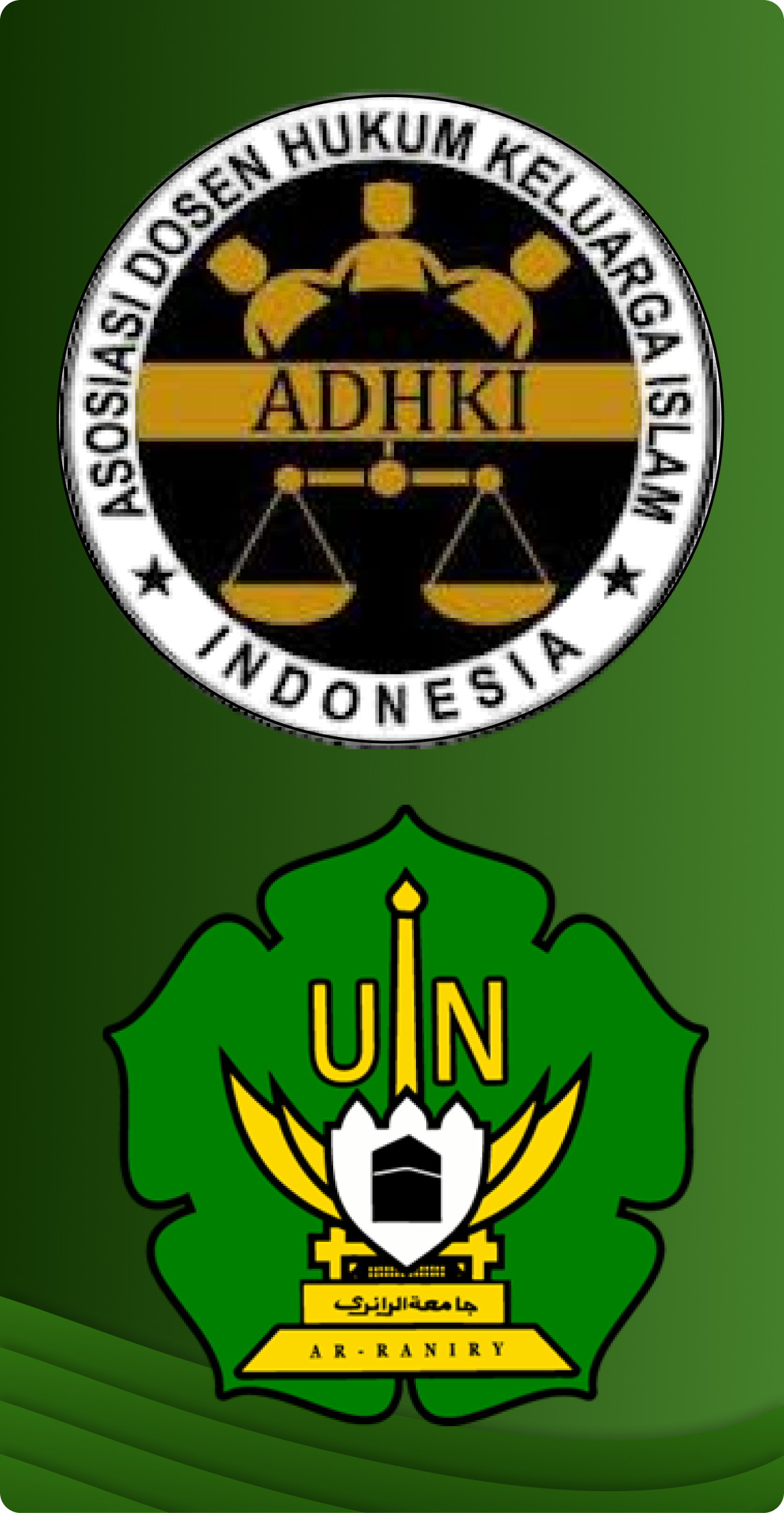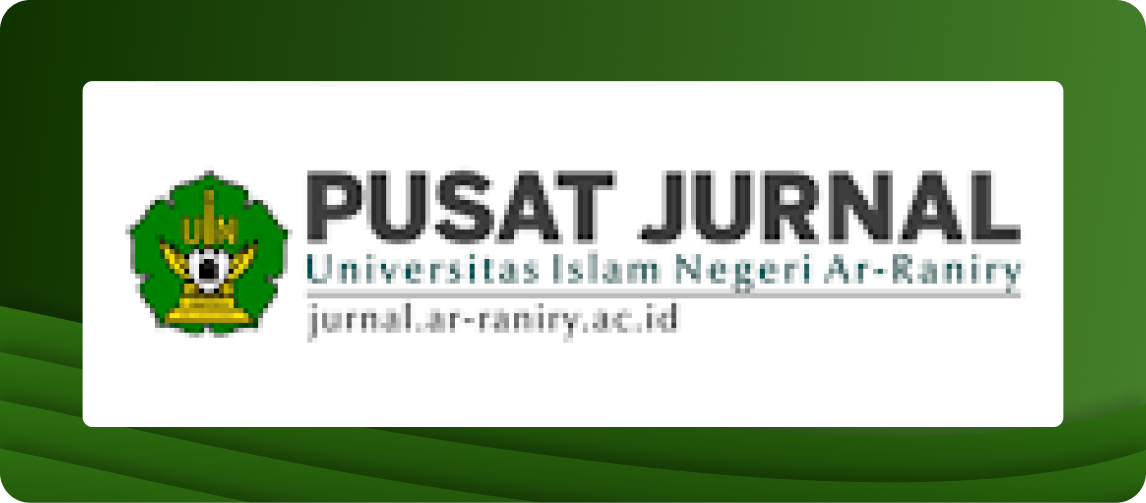The Convergence of Sufism and Sharia
The Spiritual Basis of Family Resilience in Shiddiqiyah Congregation in Jombang, Indonesia
DOI:
https://doi.org/10.22373/dvp86k16Keywords:
Sufism, Sharia, Shiddiqiyah Order, Family ResilienceAbstract
Sufi teachings play a strategic role in strengthening family resilience, particularly among the Shiddiqiyah Order community in Jombang. Sufi doctrine forms the basis for fulfilling social responsibilities as an expression of obedience to God. Sufi teachings erode worldly desires, lust and hedonism within the family, which pose a serious threat to resilience. This study aims to strengthen family functions through a Sufi approach, which in the process creates strong cohesion between Sufism and Sharia. Family resilience is created and shaped by the convergence of spirituality contained in the teachings of the order. Members of the order are able to adapt to mental, social and even economic crises through psychological and spiritual resilience. This concept is the answer to family breakdown and fragmentation caused by authoritarianism and hedonism. How is the concept of family resilience built by Sufi followers? How can Sufi teachings strengthen family resilience? This is a qualitative study, with primary data obtained from interviews and documentation. The results of the study show that the teachings of the Shiddiqiyah Order teach a balance between the Sufi and Sharia dimensions. The rituals of dzikir jahr and the heart are directed at strengthening the relationship with God, while still making worldly functions a manifestation of faith. From zikr, heart rituals and manifestations of faith can give meaning to family relationships, strengthen emotions and create openness in communication, healthy emotional expression through the concept of muhasabah as a spiritual instrument. It is this process that enables the families of the Shiddiqiyah Order to survive and harmoniously establish symbiotic relationships within the family.
References
Journals and Books
Abdillah, Muhammad Hanif, and Achmad Khudori Soleh. “Konsep Insan Kamil Al-Jili Dan Relevansinya Terhadap Masyarakat Sosial Perspektif Ilmu Tasawuf.” Mukaddimah: Jurnal Studi Islam 8, no. 2 (2023).
Abidin, Zainal, and Akhmad Sirojuddin. “Developing Spiritual Intelligence Through The Internalization of Sufistic Values: Learning From Pesantren Education.” Tafkir: Interdisciplinary Journal of Islamic Education 5, no. 2 (2024). https://doi.org/10.31538/tijie.v5i2.783.
Abitolkha, Amir Maliki, and Limas Dodi. “Socio-Sufistic Trends of Marriage in Creating Harmony in the Postmodern Society of Kampung Arab, Madura: A Perspective on the Theory of Utilitarianism.” Samarah 7, no. 2 (2023): 687–712. https://doi.org/10.22373/sjhk.v7i2.17281.
Ahmadi, Rizqa. “The Politics Of A Local Sufism In Contemporary Indonesia A Closed Look at The Shiddiqiyyah Tarekat.” Episteme 16, no. 1 (2021). https://doi.org/10.21274/epis.2021.16.1.59-82.
Amanda, Elsa, et.al., “Konstruksi Sosial Komunitas Tarekat Naqsyabandiyah Di Desa Besilam Kabupaten Langkat Sumatera Utara.” Aurelia: Jurnal Penelitian Dan Pengabdian Masyarakat Indonesia 3, no. 2 (2024).
Ardani, Ni Ketut, and R Ibrahim. “Legal Consequences of Change or Revocation of Marriage Agreement: Analysis of Marriage Law in Indonesia.” The International Journal of Social Sciences World (TIJOSSW) 4, no. 1 (2022). https://doi.org/https://doi.org/10.5281/zenodo.6381354.
Arif, Miftakhul. Tasawuf Kebangsaan: Konstruksi Nasionalisme Tarekat Shiddiqiyyah Ploso Jombang Jawa Timur. Proceeding Faqih Asy’ari Islamic Institut International Conference. Vol. 2, 2019. https://doi.org/https://jurnal.staimaba.ac.id/index.php/amb/article/view/7/4.
Azis, Aminah, et.al., “Socio-Sufism Practices within the Indonesia’s Tariqah Practitioners.” International Journal of Religion 5, no. 1 (2024). https://doi.org/10.61707/nv82ma30.
Dikuraisyin, Basar, et.al., “Reconstruction of Marriage Law: Judges’ Progressive Reasoning Based on Maqāṣid in Addressing Divergent Interpretations in Indonesian Courts.” Al-Manahij: Jurnal Kajian Hukum Islam 18, no. 2 (2024): 219–36. https://doi.org/10.24090/mnh.v18i2.9436.
Dodi, Limas, and Amir Maliki Abitolkha. “From Sufism to Resolution: Examining the Spiritual Teachings of Tarekat Shiddiqiyyah as the Theology of Peace in Indonesia.” QIJIS (Qudus International Journal of Islamic Studeis 10, no. 1 (2022). https://journal.iainkudus.ac.id/index.php/QIJIS/article/view/11260.
Efendi, Efendi, et.al., “The Existence and Contribution of Sufism in Resolving Religious Conflicts.” Islam Transformatif : Journal of Islamic Studies 7, no. 2 (2023). https://doi.org/10.30983/it.v7i2.7022.
Elmansyah, Elmansyah, et.al., “The Contribution of West Kalimantan Sufi Scholars In Promoting Community Resilience: The Great Works of The Sufis to Fulfill the Basic Needs of Societies.” Jurnal Theologia 35, no. 1 (2024). https://doi.org/10.21580/teo.2024.35.1.21490.
Fountain, Philip. “Spiritual Economies: Islam, Globalisation, and the Afterlife of Development.” The Australian Journal of Anthropology 23, no. 2 (2012). https://doi.org/10.1111/j.1757-6547.2012.00186.x.
Guo, Chunlan, and Timothy Sim. “Walsh Family Resilience Questionnaire Short Version (WFRQ-9): Development and Initial Validation for Disaster Scenarios.” Disaster Medicine and Public Health Preparedness 19 (2025). https://doi.org/10.1017/dmp.2024.348.
Hayat. Metode Penelitian Kualitatif. Malang: UNISMA Press, 2020.
Irawan, Bambang, et.al., “The Practice of Sufism And Religious Moderation In The Kauman Pesantren Communities, Central Java, Indonesia.” Religia 26, no. 1 (2023): 21–39. https://doi.org/10.28918/religia.v26i1.857.
Ismail, A Ilyas, and Badrah Uyuni. “Ghazaliâ€TMs Sufism and Its Influence in Indonesia.” DINIKA : Academic Journal of Islamic Studies 4, no. 1 (2020). https://doi.org/10.22515/dinika.v4i1.1712.
Jahar, Asep Saepudin, and Shubhan Shodiq. “Social and Religious Dimensions of Children’S Inheritance in Turkey, Saudi Arabia and Indonesia.” MIQOT: Jurnal Ilmu-Ilmu Keislaman 46, no. 1 (2022). https://doi.org/10.30821/miqot.v46i1.870.
Jasmine, Khanza. “Becoming a Fotress of Love for the Motherland: The Role of Local Sufi Order in Indonesia.” Teosofi: Jurnal Tasawuf Dan Pemikiran Islam 14, no. 1 (2014). https://doi.org/10.15642/teosofi.2024.14.1.73-95.Abstract.
Khikamuddin, M, et.al., “Al-Ghazali’s Eco-Sufism for Environmental Preservation: Living Sufism at Pesantren Al-Anwar 3 of Central Java.” Teosofia: Indonesian Journal of Islamic Mysticism 13, no. 1 (2024): 133–60. https://doi.org/10.21580/tos.v13i1.22139.
Komalasari, Mala, et.al., “Studies on Ulama’s Flow in The Modern Era from an Islamic Perspective.” Dirasah International Journal of Islamic Studies 1, no. 1 (2023). https://doi.org/10.59373/drs.v1i1.2.
Munandar, Siswoyo Aris. “Sufism and the Urban Society’s Economy: Study of the Economic Dimensions of the Tarekat Siddiqiyah In Indonesia.” Al Qalam 39, no. 2 (2022): 186–204. https://doi.org/10.32678/alqalam.v39i2.6916.
Mursalat, Mursalat, and Siswoyo Aris Munandar. “Socio-Economic Dimensions of the Al-Idrisiyah Tarekat in Indonesia: Doctrine and Practice.” Jurnal Sosiologi Reflektif 17, no. 1 (2022). https://doi.org/10.14421/jsr.v17i1.2543.
Nawwari, Muhammad Rizqy, "Modernisme Islam Di Indonesia (Telaah Tasawuf Modern Hamka)” “AL-AFKAR : Journal for Islamic Studies 7, no. 3 (2024). https://doi.org/10.21154/dialogia.v20i1.3533.2.
Nur, Hadi Ihsan, and Amir Reza Kusuma, "Kunci Kebahagiaan Dalam Perspektif Tasawuf, Antara Sufi Klasik Dan Sufi Kontemporer, “AL-AFKAR: Journal for Islamic Studies 6, no. 4 (2023). https://doi.org/10.31943/afkarjournal.v6i4.526.The.
Nurhayati, St., et.al., “Recontextualization of Wihdatul Wujud Ibnu Arabi’s Sufism with the Local Wisdom of the Indonesia’s Buginese.” International Journal of Religion 5, no. 5 (2024). https://doi.org/10.61707/e6997p13.
Prawiro, Abdurrahman Misno Bambang. “Islam Aboge: Islam and Cultural Java Dialogue (A Study of Islam Aboge Communities in Ujungmanik, Cilacap, Central Java, Indonesia).” International Journal of Nusantara Islam 1, no. 2 (2014). https://doi.org/10.15575/ijni.v1i2.29.
Putri, Yulita, and Abid Nurhuda. “Consumerism in the Context of Sufism Education.” Jurnal Hurriah: Jurnal Evaluasi Pendidikan Dan Penelitian 4, no. 2 (2023): 223–33. https://doi.org/10.56806/jh.v4i2.141.
Ramdhan. Muhammad, Metode Penelitian. Surabaya: Cipta Media Nusantara, 2021.
Rahman, Hendra Yulia. “Kemandirian Ekonomi Melalui Pendekatan Tasawuf: Implementasi Filosofi Sirih Jamaah Tarekat Shiddiqiyah.” International Conference on Muslim Society and Thought 4, no. 2 (2024). https://doi.org/10.15642/ICMUST.2024.4.1738.
Rahmatullah, Muhammad, Suwito, Ahmad Sahnan, and Hendri Purbo Waseso. “Sufism and Politics: Internalization of Political Piety in Young Sufi in Indonesia.” Revista de Gestao Social e Ambiental 18, no. 1 (2024). https://doi.org/10.24857/rgsa.v18n1-195.
Robingatun, Robingatun, Fidia Astuti, and Abdul Wasik. “Sufism Revisited: A Comprehensive Analysis of Emha Ainun Najib’s Philosophical Contributions to Modern Society.” Journal of Islamic Thought and Civilization 14, no. 1 (2024). https://doi.org/10.32350/jitc.141.21.
Sholehah, Hanifatus, et.al., “Implementasi Tarekat Shiddiqiyah Dalam Masyarakat Di Desa Sumber Sirih Kecamatan Waru.” Maklumat Journal of Da’wah and Islamic Studies 2, no. 4 (2024). https://doi.org/: https://doi.org/10.61166/maklumat.v2i4.32.
Sodik, Mochamad, and B. J. Sujibto. “Against Religious Formalism The Dynamics of Young Urban Sufism in Yogyakarta.” Journal of Indonesian Islam 17, no. 1 (2023): 1–26. https://doi.org/10.15642/JIIS.2023.17.1.1-26.
Subita, Aulia, Kamal Mukhtar, and Muhammad Fahmi. “The Connection Between the Sufi Curriculum and Character Education of Santri Dayah in Aceh.” J-PAI: Jurnal Pendidikan Agama Islam 11, no. 1 (2024). https://doi.org/10.18860/jpai.v11i1.28516 The.
Suhandi Suhandi, et.al., “Community Economic Development through a Sufism Perspective In Indonesian Islamic Boarding School.” Fikri : Jurnal Kajian Agama, Sosial Dan Budaya 8, no. 2 (2024). https://doi.org/10.25217/jf.v8i2.3906.
Sumbulah, Umi, et.al., “Islam, Local Wisdom and Religious Harmony: Religious Moderation in East-Java Christian Village Bases.” El Harakah: Jurnal Budaya Islam 24, no. 1 (2022). https://doi.org/10.18860/eh.v24i1.16264.
Supriyanto, et.al., “Spiritual Leadership and Islamic Organisational Citizenship Behaviour: Examining Mediation-Moderated Process.” International Journal of Innovation, Creativity and Change 13, no. 3 (2020).
Suwito, Suwito, et.al., “Sufism-Based Management for Improving Working Performance in the 4.0 Industrial Era: A Phenomenological Perspective.” Teosofia: Indonesian Journal of Islamic Mysticism 12, no. 1 (2023). https://doi.org/10.21580/tos.v12i1.14323.
Syaifullah, Shalahuddin Al, et.al., “The Role of Surau Godang in Improving Religious Literacy: Study at the Minangkabau Community in West Sumatra.” Progresiva : Jurnal Pemikiran Dan Pendidikan Islam 13, no. 02 (2024). https://doi.org/10.22219/progresiva.v13i02.33783.
Tedy, Armin. “Tarekat Mu’tabaroh Di Indonesia.” El-Afkar 6, no. 1 (2017).
U.N, Khodjamkulov. “The Issue of Spiritual and Patriotic Education of Young Generation in the Scientific, Political and Literary Heritage of Central Asian Thinkers.” International Journal of Psychosocial Rehabilitation 24, no. 5 (2020): 6694–6701. https://doi.org/10.37200/ijpr/v24i5/pr2020657.
Ubale, Adamu Zakiyu, and Abdul Hakim Abdullah. “The Effects Of Spirituality In Shaping The Human Behaviour (An Islamic Perspective).” International Journal of Academic Research in Business and Social Sciences 5, no. 9 (2015): 1–13. https://doi.org/10.6007/ijarbss/v5-i9/1793.
Wijaya, Zainal Abidin Muhja and Meliani Indria. “Urgency of Sufism in Solving Millennial Generation Moral Problems.” GNOSI: An Interdisciplinary Journal of Human Theory and Praxis 6, no. 2 (2023). http://gnosijournal.com/index.php/gnosi/article/view/231%0Ahttps://gnosijournal.com/index.php/gnosi/article/download/231/277.
Yazid, M. Aba, et.al., “Sufism Social Education in Government Policy Related to the Orientation of the MajelisTaklim in Indonesia.” Journal of Islamic Civilizatioan 5, no. 1 (2023).
Internet Data
Abdul Djalil. “8 Doktrin Tarekat Shiddiqiyyah Jombang, Ada Yang Menyimpang?” Kompas.com, 2023. https://news.espos.id/8-doktrin-tarekat-shiddiqiyyah-jombang-ada-yang-menyimpang-1363380.
Abdul Jalil. “Mengenal Tarekat Shiddiqiyyah Jombang; Sejarah, Doktrin, & Tujuannya.” Kompas.com, 2022. https://regional.espos.id/mengenal-tarekat-shiddiqiyyah-jombang-sejarah-doktrin-tujuannya-1362360.
Muhammad Taufik. “Apa Itu Tarekat Shiddiqiyah Dan Siapa Sebenarnya Kiai Muchammad Muchtar Mu’thi Pendirinya.” suarajatim.com, 2022. https://jatim.suara.com/read/2022/07/08/223748/apa-itu-tarekat-shiddiqiyah-dan-siapa-sebenarnya-kiai-muchammad-muchtar-muthi-pendirinya.
Syahruddin El Fikri. “Ajaran Pokok Tarekat Shiddiqiyah.” Republika, 2023. https://islamdigest.republika.co.id/berita/qfjzdf430/ajaran-pokok-tarekat-shiddiqiyah.
Syahruddin El Fikri. “Mengenal Tarekat Shiddiqiyah.” Republika, 2024. https://islamdigest.republika.co.id/berita/qfjz9e430/mengenal-tarekat-shiddiqiyah.
Tri Indriawati. “Mengenal Tarekat Shiddiqiyyah: Aliran Tasawuf Dari Jombang.” Kompas.com, 2024. https://www.kompas.com/stori/read/2022/07/07/222659279/mengenal-tarekat-shiddiqiyyah-aliran-tasawuf-dari-jombang#:~:text=Tarekat Shiddiqiyyah pertama kali muncul,Wathon minal Iman Shiddiqiyyah%2C Jombang.
Interviews
Interview with Syamsuddin Ali, Jombang, April 12, 2025
Interview with Hamid Bisri, Jombang, March 26, 2025
Interview with Kharisuddin Aqib, Jombang, April 17, 2025
Interview with Huda Ali, Jombang, May 09, 2025
Published
Versions
- 2025-09-13 (4)
- 2025-09-13 (3)
- 2025-09-13 (2)
- 2025-09-13 (1)
Issue
Section
License
Copyright (c) 2025 Amir Maliki Abitolkha, A. Halil Thahir, Akh Muzakki and Limas Dodi

This work is licensed under a Creative Commons Attribution-ShareAlike 4.0 International License.
Authors who publish in El-Usrah: Jurnal Hukum Keluarga agree to the following terms:
Authors retain copyright and grant the journal right of first publication with the work simultaneously licensed Attribution-ShareAlike 4.0 International (CC BY-SA 4.0) that allows others to share the work with an acknowledgment of the work's authorship and initial publication in this journal.
Authors are able to enter into separate, additional contractual arrangements for the non-exclusive distribution of the journal's published version of the work (e.g., post it to an institutional repository or publish it in a book), with an acknowledgment of its initial publication in this journal.
Authors are permitted and encouraged to post their work online (e.g., in institutional repositories or on their website) prior to and during the submission process, as it can lead to productive exchanges, as well as earlier and greater citation of published work. (See The Effect of Open Acces)

















